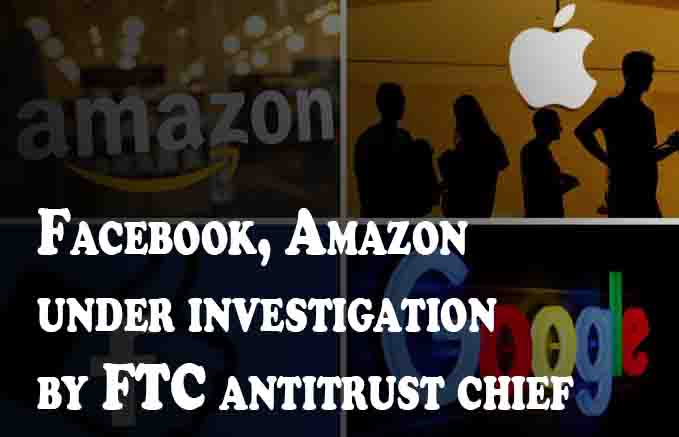A new top antitrust official has been appointed by the FTC to battle Facebook and investigate Amazon. A source told the New York Times that FTC’s antitrust division will be headed by the DOJ’s criminal antitrust prosecutor Eyitayo St. Matthew-Daniel, who has handled cases against Facebook and Amazon in the past.
There is a little-known senior criminal antitrust prosecutor at the United States The United States Department of Justice has announced that Eyitayo St. Matthew-Daniel has been selected to be the top antitrust enforcer at the Federal Trade Commission, the department’s sister agency, according to three people familiar with the matter. A previously unreported pick came from the current Acting Chair of the FTC, Rebecca Kelly Slaughter, who has a history of pursuing aggressive antitrust enforcement against big tech companies and expanding the types of cases that the agency takes on.
This would mean that St. Matthew-Daniel would oversee a nearly 300-person division of the agency that battles Facebook in court, investigates Amazon’s practices, and reviews mergers such as Nvidia’s acquisition of chip designer Arm, as well as other matters. As a result of her appointment, President Biden is set to nominate antimonopoly activist Lina Khan for the position of commissioner of the Federal Trade Commission, pending her confirmation by the Senate.

In addition to these moves, the new administration is strengthening its hand by aggressively pursuing cases against big tech companies like Facebook, which was criticized in the past for not taking action against them aggressively enough.
Table of Contents
Antitrust probes threaten Amazon, Facebook, Google
When Arizona joined scores of other states in investigating Google last year, David Espinoza appeared unimpressed with this move. There was a Phoenix-based shoe store owner who, in a local newspaper, wrote that he was “amazed and a little dumbfounded” by the latest campaign by regulators to change the way digital platforms operate.
He wrote, “The current system seems to be working well for small businesses, so let’s not try to change what isn’t broken.” He added that if the system is working, why will it change?
However, Espinoza’s words were not entirely his own, as they were published in September by the Arizona Capitol Times newspaper. Those claims were written on behalf of the CEO by a group of technologists backed by Google and other tech giants. In response to increased antitrust scrutiny, Silicon Valley has launched a stealthy campaign to shape and weaponize public perception on its behalf.
As government watchdogs continue to look at tech giants such as Amazon, Facebook, and Google, they are funding a variety of political groups that have assisted in pushing positive polling and engaged in a range of other fingerprint-free tactics to keep regulators from breaking up or penalizing the industry, under the withering microscope of government watchdogs. It is important to note that their approach is in response to the fact that the Department of Justice and the nation’s top attorneys general have been investigating them for antitrust violations.
The Connected Commerce Council, for instance, is a nonprofit organization based in Washington, D.C., which promotes itself as a voice for small businesses. In recent months, however, the group known as 3C, which comprises Amazon, Facebook and Google among other giants in Silicon Valley, has put its muscle to work to assert that the Silicon Valley giants do not pose a threat to competition, stifle smaller competitors, and harm consumers in the process.
After participating in a Google seminar intended to help small business owners better understand the benefits of using digital tools, Espinoza, a bootmaker by profession, said he was approached by 3C last year. In an opinion piece written by the advocacy group, much of which was on his behalf, the company was placed under scrutiny just a few days after state attorneys general announced they would be investigating the company over antitrust allegations. There was no indication that 3C was mainly responsible for writing the opinion piece.
According to Espinoza, he would still support Google, which has helped his company reach new customers across the country through its ad tools, which are now under investigation by the government. He also said that before being contacted by the Post this week, he had never been aware of Google’s relationship with 3C, a group that he is part of.
Espinoza said, “I’m not surprised,” he said. As a big company, Google has the finances to expand themselves to the maximum extent possible and as much as is feasible for them to do so.”
As the president of 3C, Jake Ward, said, his organization represents thousands of smaller businesses, not the biggest players in the Silicon Valley. His organization often tries to come to the aid of corporate founders by encouraging them to express their views in the public sphere.
“On behalf of our small-business members, it is our responsibility to protect the existing model and promote the market in a way that will further strengthen its performance,” Ward said, adding later: “We are not working for Big Tech, and I will never work for Big Tech.”
There was no comment from Amazon or Facebook. The Washington Post is owned by Amazon’s chief executive officer, Jeff Bezos.
As a Google spokeswoman, Julie Tarallo McAlister said in a statement, the company has made a commitment to supporting nonprofit organizations that work to help small businesses grow and thrive online, including the Connected Commerce Council.
Throughout the Silicon Valley – as well as companies in a range of different industries – a wide range of advocacy groups are often backed by Silicon Valley tech giants in order to boost their political fortunes. Ethics watchdogs say it is important that they are involved in the day-to-day decisions of these organizations, even though they are not required to disclose how much they spend on them or the extent of their involvement.
Despite the fact that it is an example of industry spending money and exerting influence, Noah Bookbinder, the executive director of Citizens for Responsibility and Ethics in Washington, the watchdog group, argues that it is a sign of the industry spending money and exerting influence in a way that gives the impression that it is not from the industry.
